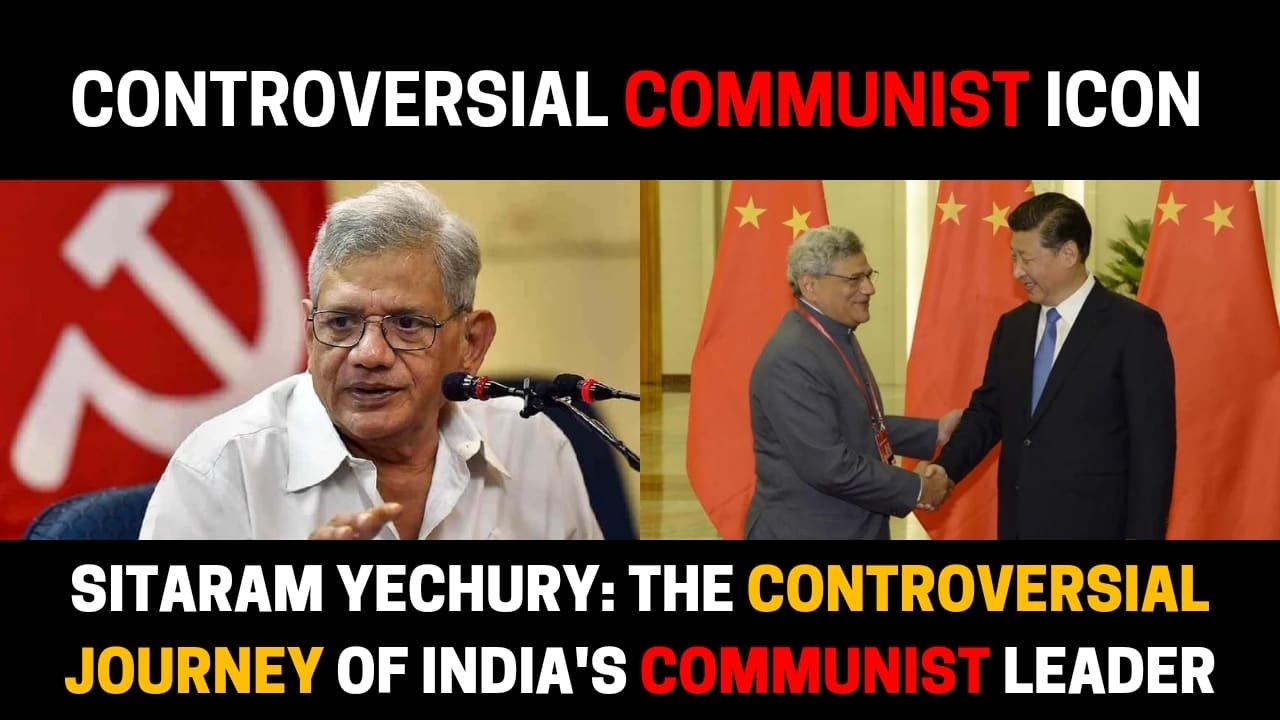Sitaram Yechury: The Controversial Face of Indian Communism
Yechury’s admiration for leaders like Xi Jinping, coupled with his endorsement of China’s political model, drew sharp criticism from human rights activists.
Total Views |

Sitaram Yechury, the former General Secretary of the Communist Party of India (Marxist), passed away on September 12, 2024, leaving behind a mixed legacy.
While his contributions to Indian communism are acknowledged, his political career was also marred by controversies, especially regarding his stance on key issues such as human rights, religion, and economic reforms.
Unyielding Stance on China
Throughout his career, Yechury faced significant criticism for his seemingly lenient approach towards China’s authoritarian regime.
Despite global condemnation of China’s human rights abuses, including the repression of Uyghur Muslims and crackdowns on political dissent, Yechury often avoided directly addressing these issues.
His refusal to condemn these atrocities openly led many to accuse him of hypocrisy, as he remained an outspoken critic of capitalist nations while largely remaining silent on China's draconian policies.
Yechury’s admiration for leaders like Xi Jinping, coupled with his endorsement of China’s political model, drew sharp criticism from human rights activists.
His failure to acknowledge China’s oppressive measures raised doubts about his commitment to global human rights.
Sabarimala Controversy
Yechury's involvement in the Sabarimala temple issue is another chapter of his political journey that attracted strong reactions.
In 2018, the CPI(M)-led Kerala government supported the Supreme Court's verdict allowing women of all ages to enter the Sabarimala temple.
While Yechury viewed this as a progressive move, his stance alienated a large section of Kerala’s Hindu voters, many of whom felt that the government was disregarding deeply held religious traditions.
The CPI(M)’s backing of the verdict, seen as a move to enforce ideological principles over religious beliefs, resulted in widespread protests across the state.
Critics argue that Yechury's inflexible approach to such sensitive issues cost his party crucial political support in Kerala, a state that has been one of the few remaining CPI(M) bastions.
Association with Radical Movements
Yechury’s political career began with his active involvement in radical student movements at Jawaharlal Nehru University (JNU), where he was elected President of the Students' Union multiple times.
During The Emergency (1975-1977), Yechury went underground before being arrested for his involvement in anti-government protests.
His leadership in these movements earned him respect among left-leaning circles, but also drew criticism for fostering a confrontational brand of activism that sometimes bordered on violence.
Under Yechury's leadership, the CPI(M) was often accused of sympathizing with Maoist groups and left-wing extremism, despite his public denials.
His opponents argued that this perceived leniency towards extremist elements weakened the party's stance on national security and law enforcement.
Opposition to Economic Reforms
Yechury was a vocal opponent of India's economic liberalization that began in the 1990s. He consistently criticized privatization and foreign investment, arguing that such policies would harm India’s working class and deepen income inequality.
However, his refusal to adapt to the rapidly changing economic landscape left the CPI(M) out of touch with a large section of the electorate, particularly urban and middle-class voters who benefited from globalization.
While Yechury's resistance to neoliberal policies appealed to the party’s traditional support base, his inability to offer viable alternatives to the government’s economic reforms led to the CPI(M)’s marginalization in national politics.
His stance was increasingly seen as dogmatic and out of step with India’s aspirations for growth and modernization.
Legacy: A Mixed Bag
Sitaram Yechury’s political career was undoubtedly impactful, but also divisive. While he will be remembered for his steadfast commitment to the communist cause and his role in resisting authoritarianism during The Emergency, his controversial positions on China, religious issues like Sabarimala, and his rigid opposition to economic reform have clouded his legacy.
As India continues to navigate complex political and economic challenges, Yechury’s legacy serves as a reminder of the importance of adapting to changing realities, while remaining true to core principles.
For Yechury, however, his strict adherence to communist ideology, even in the face of changing times, may ultimately be viewed as both his greatest strength and his most significant flaw.


